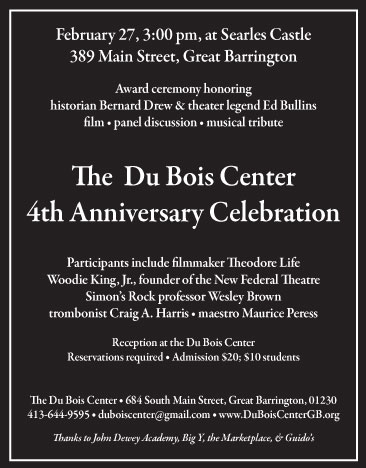The Du Bois Center 4th Anniversary Celebration
 Du Bois Center to host panel discussion and awards ceremony
Du Bois Center to host panel discussion and awards ceremony
It may be that controversy will always surround W.E.B. Du Bois, philosopher, writer and the Berkshires’ native son. But alongside the controversy marches celebration – celebration for who he was, what he thought, who he influenced and where he came from.
It is in the spirit of lauding the philosopher that the Great Barrington-based Du Bois Center (in its fourth year) is sponsoring an awards ceremony and panel discussion on Saturday, Feb. 27, from 3 to 6 p.m. at Searles Castle. The event will include the presentation of two Du Bois Pioneer Awards as well as a film (“Clara’s Ole Man”) and panel discussion on the works of legendary playwright Ed Bullins.
“This is the biggest conglomerate of black minds this area has ever experienced,” Du Bois Center Director Randy Weinstein said.
Indeed, New Federal Theater founder Woodie King Jr., filmmaker Theodore Life and novelist and Simon’s Rock professor Wesley Brown will pack quite an intellectual punch, as will maestro Maurice Press and trombonist Craig A. Harris. But “the star of the show is Bullins, without a doubt,” Weinstein said.
“Ed has created a canon of literature, and he will be honored for it. He has never gone with the crowd, and he has always done his own thing, despite controversy or what other people think,” he said.
Bullins, who has been a professor and artist-in-residence at Northeastern University since 1995, has earned a reputation over the years for his controversial plays, which include “How
Do You Do,” “In the Wine Time,” “We Righteous Bombers” and “The Taking of Miss Janie,” just to name a few. While some critics have argued that Bullins’ work is too violent and often negative in its depiction of African-Americans, Weinstein maintains that this is exactly why Bullins stands out.
Bullins himself said that he just wanted to write plays and that the rest is history.
“I wrote ‘Clara’s Ole Man’ in 1965. That was not a bad play for a young playwright. It was the perfect time for it because of the Black Arts Movement,” he said.
Bullins is the guest of honor at the event and is slated to receive the Du Bois Pioneer Award for his dedication to literature and, according to Weinstein, to truth.
“A pioneer, as I understand it, is ‘one who opens the way for others to follow,'” he said. “Ed has certainly done just that.”
Bullins said he is a “survivor very happy to be among other survivors.”
“From the moment I figured out I could write plays, it was a challenge, one that I met wholeheartedly,” he said.
Bullins is not the only recipient of the award. Local writer and historian Bernard Drew also will be in the limelight for his tireless efforts to preserve local history.
“No matter where you turn in local history, you run into Bernie,” Weinstein said. “He is the fountain of Berkshire County youth; he makes things come alive. He’s the best friend that Berkshire County has ever had.”
Drew has written 24 Berkshire histories; among them are his historical account of African-Americans in South County, “If They Close the Door on You, Go in the Window,” as well as his most recent endeavor honoring Du Bois’ more sentimental side, “Dr. Du Bois Builds His Dream House.” Additionally, Drew is a member of the Upper Housatonic African-American Heritage Trail as well as a steering committee member of the Friends of the Du Bois Homesite.
“I consider this my social justice phase,” Drew said. “Du Bois had a love for the town, and I wanted to make him a human being.”
Making a preeminent philosopher and writer a human being is no easy task, according to Drew, especially given the controversy that surrounds Du Bois’ more radical politics as an admirer of Joseph Stalin and as a socialist. Up until recently, the town has been reluctant to accept Du Bois as an integral character in local history. In 2005, following a heated debate regarding what to name the newly constructed elementary and middle schools (Du Bois’ name was struck down, as were several others deemed controversial), Great Barrington finally gave Du Bois some of his due in the form of commemorative highway signs marking his birthplace.
“The hesitance and reluctance regarding Du Bois is a matter of perspective more than anything else,” Drew said. “The community is changing. The older generation is dying and the younger generation is coming in with different, more liberal views.”
According to Weinstein, a general change in attitude is complemented by tangible changes within the community, namely the highway signs, the formation of the Friends of Du Bois Homesite, Drew’s book, a recently published book by local author Amy Bass titled “Those about Him Remained Silent: The Battle Over W.E.B. Du Bois” (University of Minnesota Press, 2009), and, of course, the opening of the Du Bois Center.
“The mission of this place is reaching the community through the community’s children,” Weinstein said. “The purpose of this event is to expose the community to this call to literary truth. This center is about telling the truth. As Du Bois did.”
The Du Bois Center fourth anniversary celebration will be held Saturday, Feb. 27, at Searles Castle (389 Main St., Great Barrington) from 3 to 6 p.m., with a reception to follow at the Du Bois Center. Tickets are $20 for general admission and $10 for students. Reservations are required. For more information, call 413-644-9595 or visit duboiscentergb.org.

